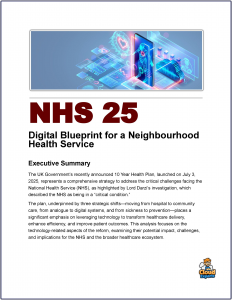 The UK Government’s 10 Year Health Plan, announced on July 3, 2025, aims to transform the National Health Service (NHS) by prioritizing technology to address its critical condition, as identified by Lord Darzi’s investigation.
The UK Government’s 10 Year Health Plan, announced on July 3, 2025, aims to transform the National Health Service (NHS) by prioritizing technology to address its critical condition, as identified by Lord Darzi’s investigation.
Central to this reform is a shift from analogue to digital systems, with the NHS App set to become the primary access point for healthcare by 2028.
The app will offer a single patient record, consolidating health data to reduce errors and repeat tests, while enabling patients to book appointments, manage conditions, and receive test results.
The headline theme is one of a ‘Neighbourhood Health Service‘, where neighbourhood health centres will house services under one roof, open at evenings and weekends, to be rolled out across the country, bringing diagnostics, mental health, post-op, rehab and nursing to people’s doorsteps.
Digital Transformation
This digital overhaul, projected to save £200 million over three years, aims to make healthcare as intuitive as online banking.
The plan also embraces transformative technologies like AI, genomics, wearables, and robotics to personalize care and boost efficiency. AI tools, such as Cancer 360, will streamline cancer diagnoses by centralizing patient data, while the Health Data Research Service, backed by up to £600 million, will accelerate clinical trials through enhanced NHS data access.
A new “innovator passport” will fast-track cutting-edge technologies, and mandatory APIs will improve data sharing across NHS trusts and social care, addressing inefficiencies from siloed systems. Additionally, the Generation Study will sequence 100,000 newborn genomes to enable early detection of conditions.
However, challenges loom. The abolition of NHS England by 2027 risks disrupting digital initiatives, while workforce shortages and digital exclusion could hinder adoption. Ethical concerns around data privacy, particularly with genomic projects, demand robust safeguards to maintain public trust.
Despite a £26 billion investment, financial constraints and the need for a skilled digital workforce pose risks. By balancing innovation with pragmatic implementation, the government can leverage technology to create a more efficient, equitable NHS, but success hinges on overcoming these hurdles through clear leadership and public engagement.




